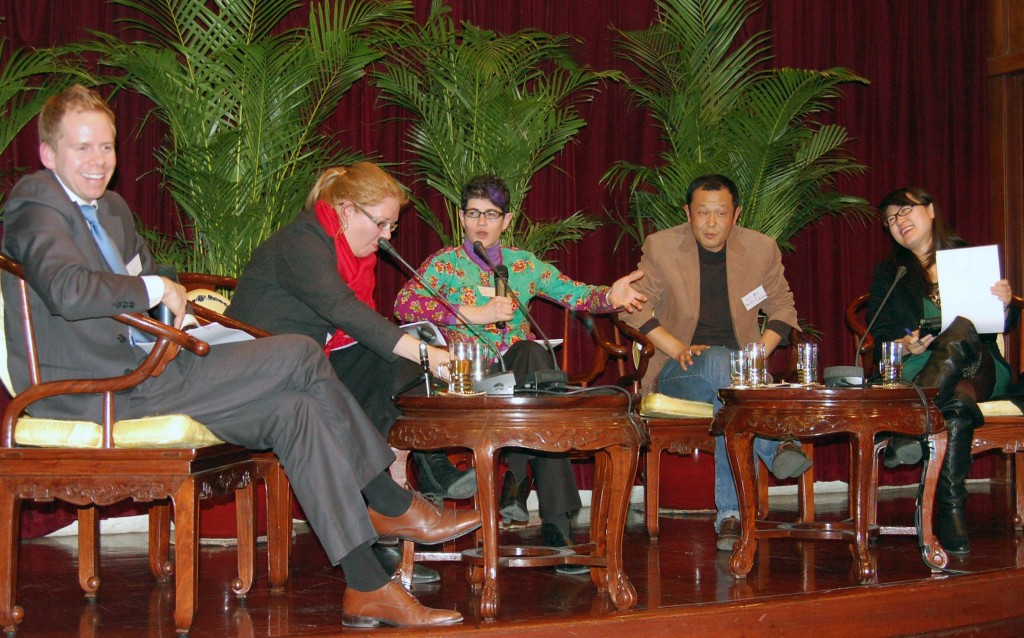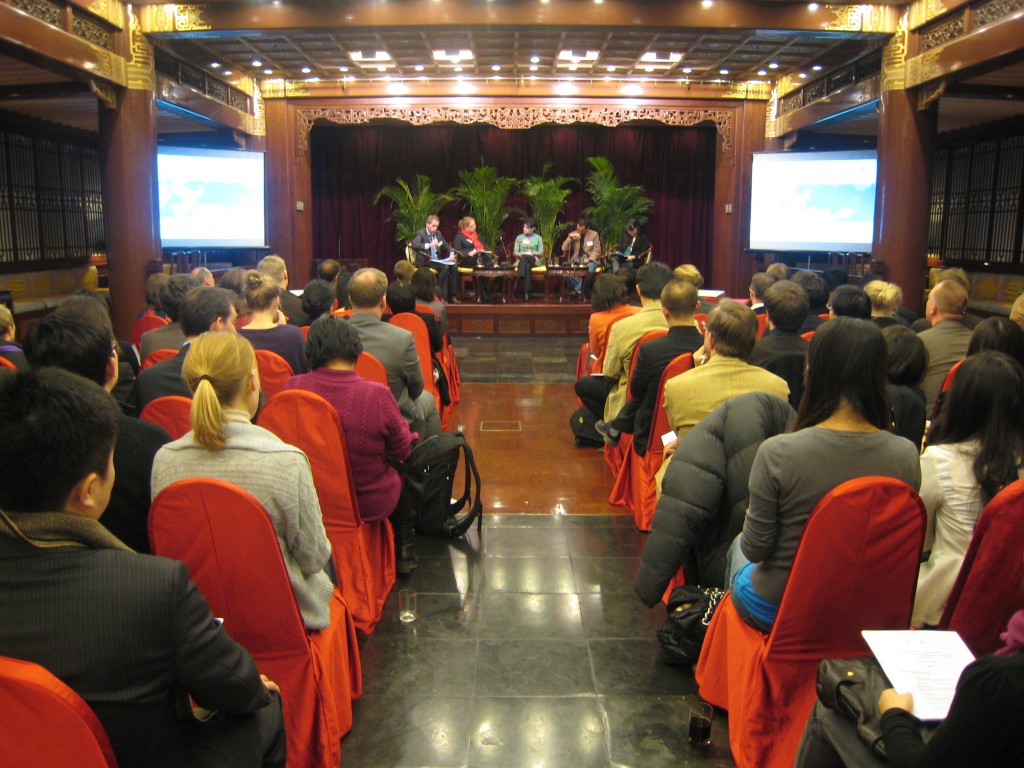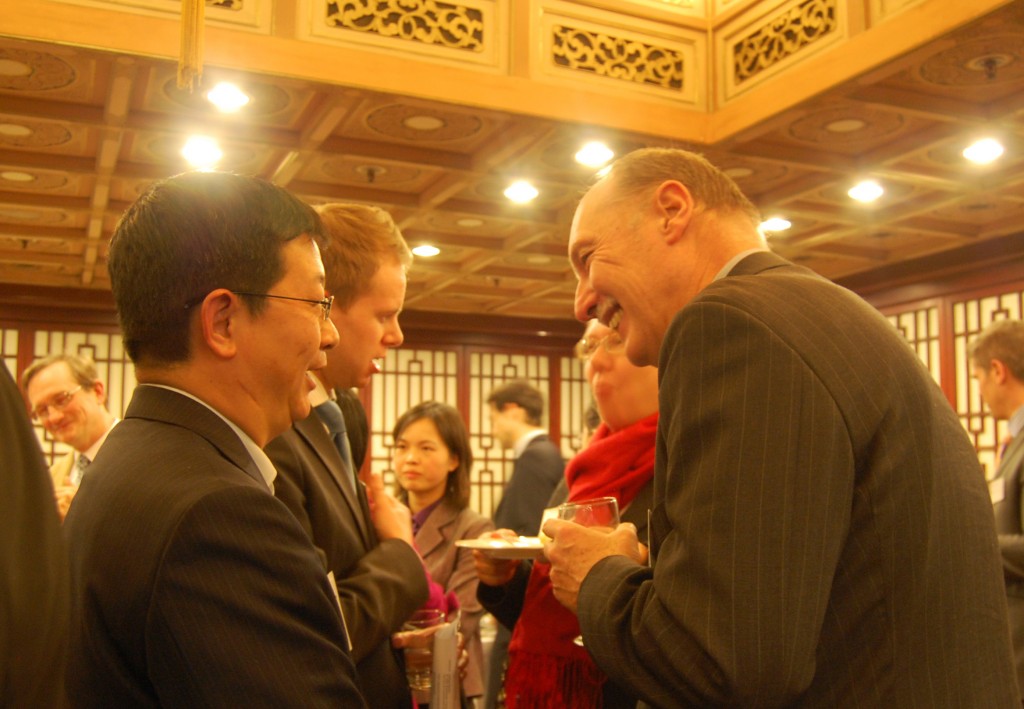The China Low Carbon Leadership Network is a communication platform and includes a series of networking and consultation events involving the climate change sector in China. It is jointly organized by the China Carbon Forum (CCF) and Deutsche Gesellschaft für Internationale Zusammenarbeit (GIZ) GmbH. ‘The Cancún Agreement – A breakthrough to a global treaty in Durban 2011?’ is the third event of the platform.
18th January, 2011
‘The Cancún Agreement – A breakthrough to a global treaty in Durban 2011?’ presented a forum for reflection on the outcome of the Cancún climate negotiations and the future of the multilateral talks leading up to Durban. Featured speakers were:
- Mr. Stefan Bundscherer, GIZ Programme Director (Opening remarks)
- Ms. Li Ting, Deputy Director of the Climate Change Office at the Ministry of Foreign Affairs and member of the Chinese Government Delegation to UNFCCC (presented a Chinese perspective)
- Ms. Heidi Hiltunen, Environment Counsellor in the EU Delegation to China (presented an EU perspective)
- Ms. Deborah Seligsohn, Principal Advisor of the China Climate and Energy Program at the World Resources Institute (presented an international NGO perspective)
- Mr. Li Bo, Executive Director of Friends of Nature (presented a Chinese NGO perspective)
- Mr. Jeff Swartz, Advisor to the Chairman at the China Carbon Forum and Broker at Evolution Markets Inc. (Moderator)
The discussion was subject to Chatham House rules.
In reflecting on the outcome of Cancún, the speakers agreed that Cancún restored faith in the multilateral negotiating process, but did not provide a solution that will reverse catastrophic climate change. It was noted that the dynamics at Cancún were much better than in Copenhagen, with countries more in the mood to compromise. However, some speakers raised concerns over imbalances in the negotiations between developed and developing countries and the sentiment that developing countries made more compromises than developed countries.
The speakers noted significant achievements made in Cancún, such as inclusion in UN documentation for the first time a global commitment to limit global warming to below 2 degrees Celsius, the integration of pledges from both developed and developing countries into the UN process, and the establishment of a Green Climate Fund (GCF). China’s constructive role in contributing to the positive outcome in Cancún (e.g. facilitating an outcome on MRV (Measurement, Reporting and Verification)), was also recognized.
Discussions on the Chinese situation in particular noted China’s growing influence on other developing countries as it develops more efficient power, renewable energy, etc. and the growth of green business opportunities between developing countries. Additionally, China’s voluntary efforts to reduce emissions was recognized by both speakers and some members of the audience. Much of the motivation for these voluntary efforts stem from domestic concerns over energy efficiency and security, economy efficiency, and interest in pollution abatement. However, some speakers also noted the challenge of integrating conflicting interests between Chinese government departments and industries, which has resulted in contradictory environmental policies.
Looking forward to Durban, a general concern expressed by both speakers and members of the audience was that the Cancún Agreement left the major issues to be resolved in Durban. These include the fate of the Kyoto Protocol (KP), the potential structure of a legally binding global agreement on emissions reductions, and details on mechanisms like MRV, ICA (international consultation and analysis) and the GCF. Much discussion focused on the KP, and speakers present at Cancún noted that some countries are open to a second commitment period. However, a core problem with the KP is that it only represents 30% of global emissions, which is an insufficient level of overall commitment to meet emissions targets.
Despite the many challenges that negotiators and country governments face leading up to Durban, the speakers stressed the importance of maintaining a positive outlook along with a realistic picture of what is possible. Progress will be slow and step-by-step, but it is important nevertheless to keep pushing the ball forward.
Over 90 people from foreign embassies and institutions, Chinese government, NGOs, industry and academia attended the event. Participants engaged in lively Q&A with the speakers during the panel discussion, and many lingered long afterward to network and discuss the topics of the evening.

To see more photos from the event, visit the LCLN Flickr photostream: http://www.flickr.com/photos/58908573@N08/sets/72157625796478415/.
——————————————————————————————————————————
For a brief overview of the Cancún negotiations, read Cancun Summit Review, our background report on the talks.




